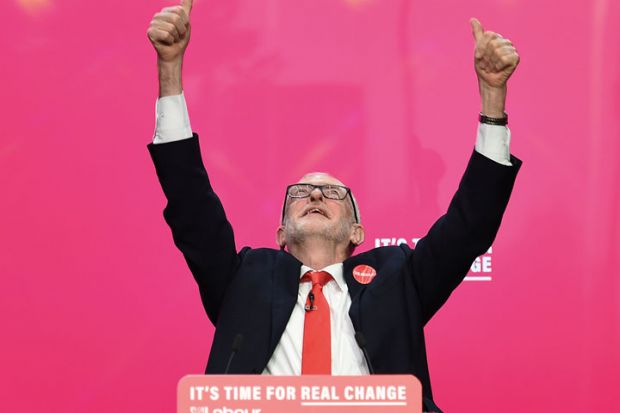The Conservative and Labour manifestos both have clear philosophies unifying their pledges on English universities: the former intensely sceptical of higher education in its expanded form, the latter committed to ending what it calls “the failed free-market experiment” in the sector.
There is a battle of ideas here, and both agendas promise to bring transformation to the sector.
The Tory general election manifesto, co-authored by Rachel Wolf, who was an adviser to Boris Johnson in his time as shadow higher education minister, opens its section on universities with praise before moving on to a critical agenda: a commitment to consider the Augar review’s “thoughtful recommendations” not just on tuition fees but on “the balance of funding between universities, further education and apprenticeships and adult learning”; to “tackle the problem of grade inflation and low-quality courses”; and to “improve the application and offer system”.
These commitments can be distilled into a particular argument: too many people are going to university; too many are studying courses that do not lead to sufficient rewards in the labour market; grade inflation and unconditional offers (the latter often seen as a consequence of previous Tory policy to abolish student number controls) are rampant.
The manifesto thus connects with right-wing newspapers and Tory backbenchers, who advance this argument in its most simplistic form, and with the line of thinking advanced in the Augar review, which takes a more “thoughtful” approach to this argument. Ms Wolf is the daughter of Baroness Wolf, a member of the Augar panel and Sir Roy Griffiths professor of public sector management at King’s College London, a long-standing critic of higher education expansion driven by “unrealistic expectations” of resulting productivity growth and enhanced social mobility.
Guy Miscampbell, senior research fellow at the thinktank Onward, established by senior Conservative figures, which has previously analysed graduate earnings data to spotlight what it terms “low-value university degrees”, welcomed the manifesto’s commitment “to look at the balance between poor-value HE and other alternatives used by the half of the population who don’t go to university”.
“The public are increasingly sceptical of the value that some poorer performing universities are offering compared to options like apprenticeships, and it’s good that some political parties are listening,” he said.
Alongside scepticism about the economic value of some universities is scepticism about the supposed politics of universities, in a pledge to “strengthen academic freedom and free speech in universities”.
This conjunction could prove significant. For Conservative concern about perceived left-wing “bias” in universities could, in its most cynical form, culminate in the question: why should Conservative governments continue to fund expanded higher education if graduates are increasingly unlikely to vote Conservative?
At a time when the Conservatives are shifting their electoral priorities towards largely non-graduate Leave voters, and when accounting changes have made student loans more immediately costly for the government, many in the party would see a withdrawal of support for expanded higher education as making strategic sense.
Meanwhile, Labour has a range of policies, beyond just the abolition of tuition fees, that are united by their anti-marketisation character – a development on the muddled section on fees in the party’s 2017 manifesto.
The pledges to “fundamentally rethink the assessment of research and teaching quality” (currently market mechanisms in their own ways), to create a new funding formula that “ends the casualisation of staff” and to “transform the Office for Students from a market regulator to a body of the National Education Service” all stick to the theme.
When it comes to Labour’s policy to abolish fees, there has been understandable focus on the costs of such a pledge – £7.2 billion in the current manifesto. But another notable aspect of the policy is its anti-market character: abolishing fees ends any prospect of the creation of a market in which the prestigious universities charge higher fees than the universities that admit socially disadvantaged students.
Martin O’Neill, senior lecturer in political philosophy at the University of York, regarded as one of the key thinkers on Labour’s economic model under Jeremy Corbyn, said the party’s higher education policies were “all driven by the fundamental point that universities should be seen as public institutions that together contribute to our shared public life, rather than as businesses driven by competition and the profit motive”.
Dr O’Neill, co-author of the recent book The Case for Community Wealth Building, continued: “The problems with Britain’s universities that have led to the current University and College Union strikes – too much power and too much pay for those at the top of the hierarchy, alongside a growing sense of precarity and powerlessness for everyone else – are a microcosm of the broader problems in our current economic model.”
He argued that “universities can be a test case for the more collaborative, democratic and participatory institutions that a Labour government would seek to create and nurture”.
Critics – including some vice-chancellors, perhaps – are likely to counter that Labour’s plans are too statist, too instrumentalist for a sector that thrives on institutional autonomy and diversity.
Labour is adamant about the ills of the market. And even the Conservatives now have reservations about some of the markets in higher education – although only some. Notably, the Conservatives’ plans to target “low-quality courses” signal a potential accentuation of the market in institutional prestige.
But after a fully pro-marketisation, pro-expansion era, change is coming one way or another.
john.morgan@timeshighereducation.com
Listen: John Morgan wades through the 2019 party manifestos and discusses how the parties’ proposals will affect higher education in our THE podcast
Register to continue
Why register?
- Registration is free and only takes a moment
- Once registered, you can read 3 articles a month
- Sign up for our newsletter
Subscribe
Or subscribe for unlimited access to:
- Unlimited access to news, views, insights & reviews
- Digital editions
- Digital access to THE’s university and college rankings analysis
Already registered or a current subscriber? Login








